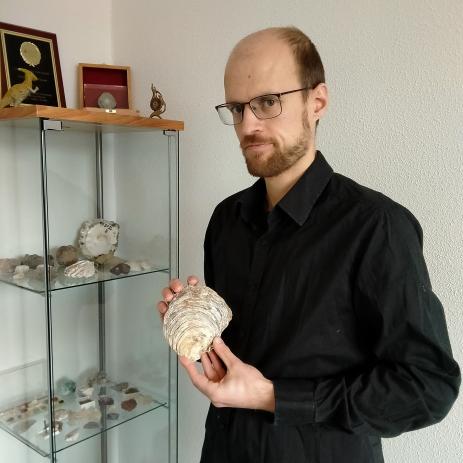
Prof. Dr. Niels de Winter
Biography
2024 FWO Climate price awardee at AMGC-VUB
Assistant Professor in Marine Geology, Dept. of Earth Sciences, Vrije Universiteit Amsterdam, since 2023.
FWO Post-doctoral Fellow at AMGC-VUB (2019-2023)
Marie Skłodowska-Curie post-doctoral fellow at Utrecht University, NL (2020-2022)
PhD VUB 2019: Improving techniques and interpretations for reconstructing high-resolution paleoclimate in deep time from bivalve shells and tooth enamel
PROJECT TITLE:
Improving the accuracy of techniques for high-resolution seasonal-scale climate reconstructions from bivalve shells
PROJECT SUMMARY:
Anthropogenic global warming is changing Earth’s climate extremely rapidly. However, paleoclimate reconstructions focus almost exclusively on long-term trends (thousands to millions of years). To calibrate climate models and study the causes and effects of rapid climate change requires high-resolution climate archives. Bivalve shells are the ideal archive for studying these changes, because contrary to sedimentary archives, they record environmental conditions down to daily resolution. Unfortunately, physiological effects distort conventional climate proxies in bivalve shells, complicating climate reconstructions. This project develops new, accurate tools for sub-annual scale climate reconstructions in three species of bivalve using high resolution (< 50 μm) trace element and microstructure analyses on cross sections through their shells combined with the novel clumped isotope method, which reconstructs absolute seawater temperatures. First, for accurate calibration, this multi-proxy approach is tested on bivalves grown in monitored North Sea environments. The new proxies are then applied on recent bivalves to reconstruct sub-annual climate change in the past 500 years, recording human impact in the North Sea. Finally, fossil bivalve shells from the warm Miocene epoch are used to study the effect of global warming on short-term climate variability. Acquiring these well-constrained sub-annual paleoclimate records will improve predictions of climate extremes on a warming planet.
Former Marie Skłodowska-Curie Post-doctoral fellow at Utrecht University (2020-2022).
PROJECT TITLE:
UNBIAS: UNravelling BIvalve Shell chemistry: Improving the accuracy of techniques for high-resolution seasonal scale climate reconstructions from bivalve shells
PROJECT SUMMARY:
Geologists study climate of the past to learn more about Earth’s climate in the present and future. However, climate is usually studied on a long timescale (thousands to millions of years), while rapid changes in climate (like those associated with the present global warming) are also very important to understand. The study of seasonal differences in the geological past helps us to understand not only how Earth’s climate and environment behaved over a long time period, but also how dynamic it was and how short term, extreme changes took place. This will help us understand changes in climate and environment that take place on the human timescale.
RESEARCH OBJECTIVE:
Improving reconstructions of past climate change on a seasonal timescale using stable isotope and trace element proxies for in mollusk shells.
FIELD SITES:
Controlled growth experiments as well as wild specimens of modern marine bivalves from the North Sea region:
- European flat oyster: Ostrea edulis
- Blue mussel: Mytilus edulis
- Common cockle: Cerastoderma edule
- Ocean quahog: Arctica islandica
Late Cretaceous (65-80 million year old) fossil bivalves from Argentina, Oman, Sweden and the Mediterranean region.
Middle Eocene (40-50 million year old) fossil gastropods from France, the Netherlands and United Kingdom.
Pliocene and Miocene (2-20 million years old) fossil bivalves from Belgium, the Netherlands and France.
KEYWORDS:
Sclerochronology, Seasonality, Stable Isotopes, Trace Elements, Mollusks, Carbonate Clumped Isotopes, Growth Experiments
COLLABORATORS:
EDUCATION
- PhD in Science – 2019 – Vrije Universiteit Brussel, Advisor, Ph. Claeys
- MSc Earth, Life and Climate - 2013 – Utrecht University
- BSc Earth Science – 2011 - Utrecht University
